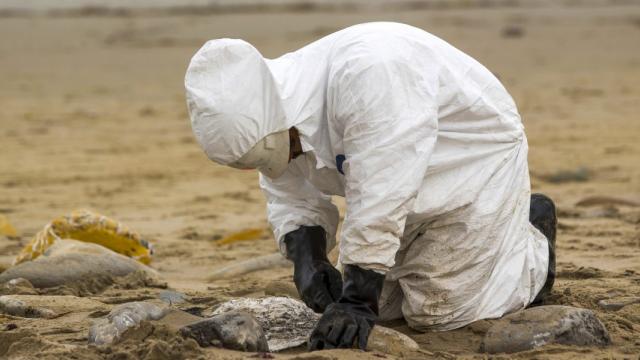
A pipeline spill in Alberta, Canada has leaked some 1,320,000 gallons, or 31,000 barrels, of emulsion — a mixture of bitumen, produced water, and sand — south of Fort McMurray, a hub for Canada’s tar sands mining and refining industry.
The leak, which was discovered Wednesday afternoon, is the largest pipeline spill in the province in 35 years, when a 54,000 barrel oil spill became Canada’s worst-ever pipeline incident.
Pipeline operator Nexen Energy, a subsidiary of China's CNOOC Ltd, and the Alberta Energy Regulator had not as of Friday identified the cause of the leak, which has been contained. At this point there are no reports of injuries to wildlife or contamination of nearby bodies of water. The spill covered some 170,000 square feet, of four acres, mostly along the path of the pipeline.
Bitumen is a combination of viscous tar sands crude oil and liquid chemicals like benzene that dilute the crude so it can be piped to refineries. Produced water is water used during the process of oil or gas extraction that can contain hydraulic fracturing chemical additives and naturally occurring substances and is not suitable for irrigation or drinking. It must be stored in tanks or pits before being treated and disposed.
In a statement about the spill, Greenpeace communications officer Peter Louwe said the leak is “a good reminder that Alberta has a long way to go to address its pipeline problems, and that communities have good reasons to fear having more built.”
“New pipelines would also facilitate the expansion of the tar sands — Canada’s fastest-growing source of carbon emissions — and accelerate the climate crisis even more,” he said.
Greenpeace and other environmental organizations have fought hard to prevent the Keystone XL pipeline from being built, which would transport up to 830,000 barrels of Canadian tar sands oil per day down to Gulf Coast refineries. While Obama vetoed legislation approving the construction of the pipeline in February, it is still under review by the State Department — as it has been for more than six years.
Meanwhile, Alberta is not the only place where oil spills are demanding attention. Halfway around the world in Australia, a potential oil spill was found on Friday along the Great Barrier Reef. The Reef, an especially delicate ecosystem and World Heritage Site, has come under multiple stressors in recent years, including development, fossil fuel export, and climate change.
Authorities are still investigating the cause and extent of the spill.
In the United States, upgrading a dated pipeline system has become one of the few bipartisan environmental issues in the 114th Congress. At a recent House Energy and Commerce subcommittee hearing, Democrats and Republicans took the Pipeline and Hazardous Materials Safety Administration (PHMSA) to task for failing to implement several provisions of a pipeline safety law. A recent 105,000-gallon oil spill along the southern coast of California near Santa Barbara — a stronghold of the environmental movement — has galvanized elected officials into addressing the issue.
Politicians differ on what the solution should be. While environmentalists and politicians concerned with the impacts of climate change would like to see a reduction in oil and gas production alongside any upgrades, many Republicans want to build more new pipelines — including the Keystone XL.
3 WAYS TO SHOW YOUR SUPPORT
- Log in to post comments











